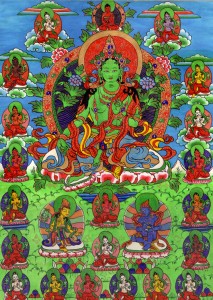Thupten Shedrub Gyatso, who was a Tulku in one of the Palyul Monasteries, wrote this commentary. His present incarnation, Rago Chogtrul currently lives in Tibet.
Translation by Khenpo Tenzin Norgey ~ Spring, 2004,
Palyul Retreat Center, Mc Donough, NY USA ~Wood Monkey Year 2131
The Benefits of Reciting the Praise
The wise one endowed with pure respect for the goddess,
Who recites these praises with perfect devotion
Remembering her in the evening and upon waking at dawn,
Will be endowed with complete freedom from fear.
A practitioner who recites the praise in the evening and at dawn, recallingTara’s qualities with pure devotion, and has the wisdom to discriminate between good and bad will be protected from the sixteen fears. Others will be endowed with complete freedom from all fears. It is also said that we must meditate on her wrathful form in the evening to pacify the harms of this life, and visualize her peaceful form at dawn and recite the praises to save ourselves from rebirth in the lower realms.
All their sins will be pacified,
Causing destruction to all lower realms.
And the seven million Victorious Ones
Will quickly grant them empowerment.
Thus, they will attain greatness, and progress
To the stage of Buddhahood.
The daily practice of the Twenty-One Praises toTarawill cause all of the practitioner’s sins to be pacified and purified. Those who recite the praise will not experience the sufferings of the lower realms. The seven million Victorious Ones who abide with the Noble Lady will swiftly bless and empower the practitioners. In this life, the practitioners of this praise will achieve the great bliss of place, body, retinue, and the qualities of the dharma of transmitted precepts and realization. They will swiftly attain the paths and bhumis, and reach the ultimate state of enlightenment.
By remembering Her, the most violent poisons
Abiding in the earth or in beings
Whether eaten or drunk
Will be completely removed.
At the conventional level, practitioners will be protected from terrible diseases, and the pain caused by aconite and other inanimate poisons. They will be protected from the poisonous fangs, horns, stings and bites of animals. The practice will also provide protection from the poisonous effect of the evil intentions of malignant spirits, protection from their touch, and the evil eye. By remembering the goddess and her mantra, the harmful effect of poisons whether they have been eaten or drunk will be nullified.
This can eliminate various sufferings
Inflicted by the spirits, epidemics, and poisons
Even if done for the sake of other beings.
The practice can easily eliminate the suffering inflicted by outer and inner poisons, by dangerous epidemics and possession by evil spirits. The same benefit can be achieved if the praise is recited for the sake other beings.
On sincerely reciting twice, three times, and seven times
The wish to have child will be fulfilled
And the desire for wealth can be achieved.
All the wishes will be fulfilled
Every hindrance destroyed in its turn
We must recite the praise twice, three and seven times in one session. We can do the practice either two sessions a day: once during the day, and once during the night, or three sessions during the day and three sessions at night. The Vajra holders of Indiaand Tibetteach that if one practices the sadhana of “The Four Mandala Offerings[i]” in this way, the desire to have children to continue one’s family line, or to provide students to uphold the dharma lineage will be fulfilled. In the same way, if one wishes to have wealth for the happiness of this life and the next, excellent prosperity can easily be achieved. Likewise, any other activities: siddhis[ii], temporal desires and ultimate wishes will be fulfilled. By the compassion of the Venerable Mother, unfavorable obstacles in the future will not manifest, and harm will not arise from obstacles that have already occurred. Since all purposes can be fully achieved, the wise must practice this sadhana with enthusiasm.
By explaining the Twenty-One Praises with devotion,
May all access the ocean of siddhis, clear all obstacles
And have the auspiciousness of complete enlightenment,
By swiftly having a vision of Her face, embraced
By the unchanging bliss, endowed with all supreme attributes.
To summarize the text, the meaning of the root mantra is shown in the form of praise. The twenty-one verses of homage show the twenty-one manifestations of the goddess.
Thupten Shedrub Gyatso, who was a Tulku[iii]in one of the Palyul Monasteries, wrote this commentary. His present incarnation, Rago Chogtrul currently lives inTibet.
[i] mandala skt offering ~ A Tantric practice in which all precious things are offered to the deities, Buddhas and Bodhisattvas in order to develop generosity, the first of the six perfections.
[ii] siddhi skt ~ Spiritual accomplishments which may be mundane or supramundane. Buddhahood is the ultimate siddhi, mundane siddhis include clairvoyance, clairaudience, flying, etc.
[iii] tulku Tib ~ A reincarnate lama. The Tibetan translation of the Sanskrit “nirmanakaya”, used as an honorific term for recognized incarnations of lamas, who are found, usually in childhood, and are brought up to inherit the lineage and often the monastic foundations of their predecessors.











